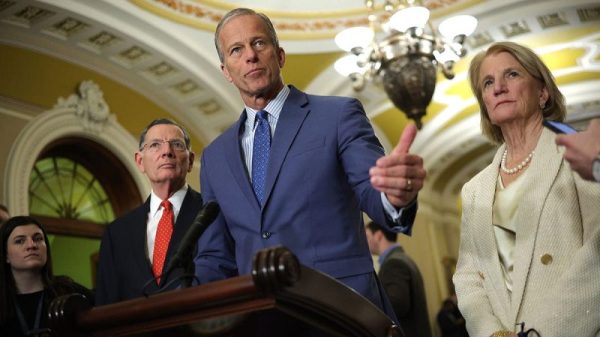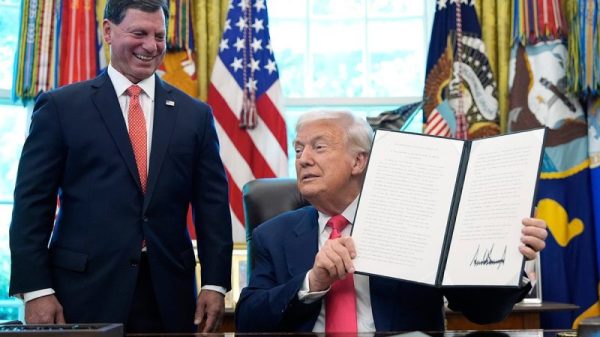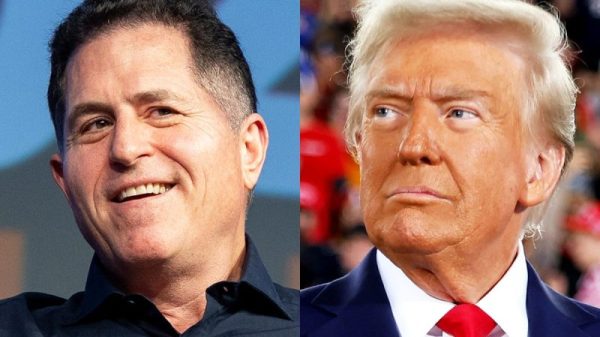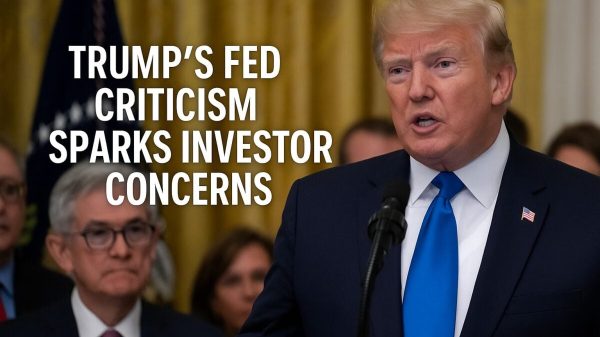It’s been one of the less remarked-upon moments from Tuesday’s jam-packed debate between former president Donald Trump and Vice President Kamala Harris. But one of the most subtly remarkable exchanges came when the topic turned to the war in Ukraine.
Trump was twice asked to say whether he wanted Ukraine to win the war, and he punted both times — declining to take the side of a U.S. ally against an invading foe, Russia.
That answer is far out of step with the American people and epitomizes a Trump who, as my colleague Philip Bump notes, doesn’t seem to know how to speak, or care to speak, to people outside the right-wing media bubble.
But more than that, it’s just politically puzzling.
To recap, ABC News’s David Muir twice asked Trump whether he wanted Ukraine to win, and Trump talked around it both times.
“I want the war to stop,” Trump deflected the first time. “I want to save lives that are being uselessly — people being killed by the millions.” (Actual estimates place the war dead significantly lower than Trump’s number.)
When pressed again, Trump deflected again.
“I think it’s the U.S.’s best interest to get this war finished and just get it done,” Trump said. He said the United States should “negotiate a deal, because we have to stop all of these human lives from being destroyed.”
This isn’t entirely new territory for Trump. He offered a similarly noncommittal response last year when asked the same question at a CNN town hall. (When it comes to the war, Trump said that he doesn’t “think in terms of winning and losing.”)
But that was during a Republican presidential primary process in which, it could be argued, supporting Ukraine too openly could have been a liability. Many Republicans — and the most vocal ones — have been staunchly against sending more aid to Ukraine.
When it comes to general-election voters, though, it’s not really even a close call.
An Economist/YouGov poll last month showed that 63 percent of Americans said they sympathized with Ukraine over Russia, while just 3 percent sympathized more with Russia. That’s a 21-to-1 margin.
Another YouGov poll this year asked directly “who do you want to win.” Americans chose Ukraine over Russia, 72-4 — an 18-to-1 margin.
Trump’s comment may align with a significant chunk of Republicans. The former poll showed 37 percent of Republicans said they sympathized more with “neither” side. The latter showed a quarter of Republicans didn’t say they preferred a Ukraine victory (many said they “didn’t know”).
But these are still losing positions even within the GOP. Lots of Republican base voters are skeptical of funding Ukraine’s defense; that doesn’t mean they don’t want Ukraine to win. And indeed, other polling has shown large majorities of Republicans are quite concerned about the threat Russia poses.
To that point, something else about that more recent poll jumped out at me last month. It showed voters didn’t just perceive Trump as being indifferent to Ukraine’s fate; they actually believed he favors Russia, on balance.
In addition to asking people where their own sympathies lie, it asked about where they thought Trump’s, Harris’s and President Joe Biden’s are found.
Americans overwhelmingly said that Harris and Biden favored Ukraine, but nearly twice as many said Trump favored Russia (37 percent) as said he favored Ukraine (21 percent).
Just 21% of Americans think Trump’s sympathies lie more with Ukraine than Russia.
37% say he prefers Russia. pic.twitter.com/kUIbtLyvjM
— Aaron Blake (@AaronBlake) August 21, 2024
We can certainly talk about the reasons Trump won’t say he wants Ukraine to win. He’s long crafted a cozier relationship with Russian President Vladimir Putin than many aides and foreign policy experts are comfortable with, and his administration’s steps to get tough with Russia often seemed to come despite Trump. Trump could harbor hard feelings about Ukraine’s role in his first impeachment and the Russia investigation. And if we’re being charitable, perhaps Trump believes that picking sides would make brokering a peace deal more difficult.
But we shouldn’t lose sight of the fact that, for whatever reason, a former U.S. president is declining to take the side of a U.S. ally that was invaded by an increasingly antagonistic foe — a foe that an indictment just last week said is continuing to interfere in American elections. And he’s doing so even as this isn’t a close call for the American public.
Trump did plenty to marginalize himself at the debate, and this certainly contributed to that.






































